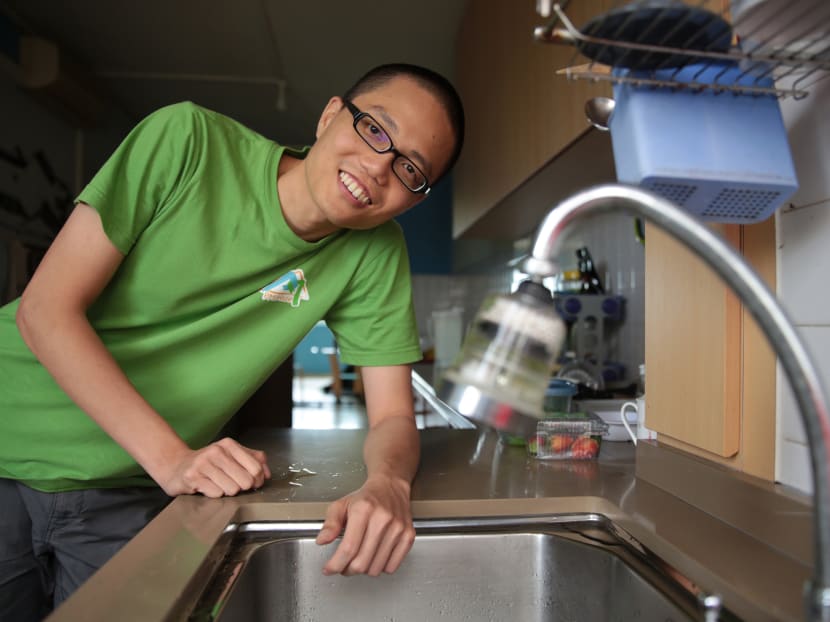To reduce water usage, price hikes alone won't be enough: Green groups
SINGAPORE — Getting Singaporeans to cut down on their water usage should not be done through a “carrot-and-stick” approach alone, green groups here said, as they called for more concerted, long-term efforts to help the population learn to be more caring towards the resource and the environment at large.

Mr Tan Yi Han (above), environmental advocate and co-founder of non-governmental organisation People’s Movement to Stop Haze, with a faucet fitted with a thimble (below) that regulates water pressure at home to help save water. Photo: Jason Quah
SINGAPORE — Getting Singaporeans to cut down on their water usage should not be done through a “carrot-and-stick” approach alone, green groups here said, as they called for more concerted, long-term efforts to help the population learn to be more caring towards the resource and the environment at large.
Finance Minister Heng Swee Keat announced in his Budget speech that water prices would rise by 30 per cent from July 2018, with the first of two rounds of water price hikes to kick in this July. Responding to the outcry over this move, Minister for the Environment and Water Resources Masagos Zulkifli said in Parliament last Wednesday (March 1) that water has to be priced fully as it is a matter of national security, and that consumers “must feel the price of water” to realise its value.
However, when it comes to getting people to treat water as a precious resource, Mr Tan Yi Han, co-founder of non-governmental organisation People’s Movement to Stop Haze, called for new ways to tackle the issue and not just to increase the cost. He bemoaned the fact that public education on water conservation is still quite “lacking” here, and suggested that environmental groups offer “targeted advice” and tips that people may readily adopt.
“(It’s not effective) to tell someone who is already taking short showers to cut down even more,” Mr Tan said. “Rather, give them advice on buying the right kind of washing machine, or new technologies to adopt at home which can (significantly cut down) on water usage.”
He also suggested having water-rationing exercises, because their proven educational value outweighs their inconvenience.
“The Government has to decide ... if stronger interventions like (water rationing) are needed to change behaviour … because the risk is that even if you increase the price, people might not change their ways … so the same amount of water continues to be used,” he added.
Urban farmer Calvin Soh, who co-designed and sells the plant-watering device Grow-It-Yourself Stick, is of the view that Singaporeans should look beyond responding to this as a “water-only” issue, but to see how it could train them to reduce wastage in all areas.
Commenting on how Scandinavian countries such as Sweden have been so effective at recycling waste that they import rubbish from other countries to keep their recycling plants going, Mr Soh said: “Once we (become) more mindful about using less resources, (change) will happen naturally and we will use less plastic or harmful materials, or less electricity.”
The older generation in Singapore would know the value of water because they had to face water scarcity in the early days of the country’s development, one observer said, adding that the younger generation did not have to face such challenges.
Dr Adil Dhalla, deputy director of the Nanyang Environment and Water Research Institute at Nanyang Technological University, said: “The biggest misconception (the younger generation has) is that water-saving habits are just ‘nice to do’, when they are absolutely vital to the nation’s water security, and should be inculcated as part of our behavioural DNA.”
Given that Singapore is highly urbanised, another view is that its people have somehow forgotten that they are living on a small parcel of land.
Ms Olivia Choong, co-founder of Green Drinks Singapore, a non-profit organisation promoting collaboration on environmental issues, said: “Like oil, water prices can sometimes go up and down. People seem to have forgotten that we are islanders, but we have to realise that water is precious.”
Singaporeans who spoke to TODAY expressed grudging acceptance towards having to pay more for water, although many said that they did not plan to change their habits because they felt they were already not using much water.
Mr Shawn Lim, 29, an army personnel who lives in a four-room flat and pays about S$50 monthly for water, does not intend to cut down on usage. “We can’t change a lot. We still need to use a certain amount daily, so (imposing prices) might not change the way people behave,” he said.
System analyst Vincent Tan, 59, who has four people in his household living in a maisonette unit and whose monthly utilities bill is about S$100, already has a habit of saving water where possible. “The water-rationing exercises in the past impacted us and we remember how precious the water was … But now, our Government keeps talking about NEWater, or desalination plants, so the people, like the young, become complacent and think that we have enough, so they don’t need to worry.”
While water rationing might seem “drastic”, it could instil a sense of urgency, he added. “If you ask them to pay another S$20 to S$30, it might not make such a difference to them, people get used to it and will start wasting water again.”
Certainly, the price hike is not an issue with sales specialist Tan Han Yang, 27, because his parents foot the utility bills. He said: “For our parents, water was a privilege … but for the younger generation, water (has been coming) readily from the tap as far as we know … so they just go about (thinking), ‘I don’t need to save water, and I’m just going to continue with my life’.”









